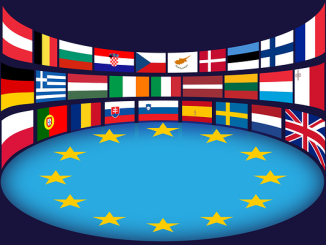One could argue that the introduction of the euro in 1999 marked the end of the beginning for the European Union, its biggest step toward realizing its treaty objective of “ever closer union.”
One could also argue that the events of 2015, which have made a mockery of that treaty exhortation, mark the beginning of the end.
I think it is highly unlikely that the EU will actually dissolve, or even greatly shrink, in terms of its national membership or external borders. But I now believe that in five years its scope and role in the life of its 28 member states, as well as in the international economy, will probably be far smaller than it is today.
The European integration project has suffered four major blows this year alone. It could have withstood any one of them without much difficulty, and maybe it could even have survived a couple. But taken together, I think this year’s events have outlined a future not of greater integration, but of greater independence asserted by the sovereign states that still comprise the union.
First there was the British election in May. David Cameron’s Conservative Party swept to a surprising landslide across the United Kingdom and a parliamentary majority, based in no small part on Cameron’s pledge to renegotiate the terms of Britain’s EU membership and then to put that continued membership to a national referendum no later than 2017.
Britain is already something less than a fully engaged partner in the European project. It rejected surrendering its currency in favor of the euro, which as a side effect kept Britain mainly out of the financial wrangling over rescue packages for Greece. The UK also has an opt-out clause allowing it to decline to participate in EU asylum quotas, a clause which Cameron’s government exercised this spring and reaffirmed last month after EU ministers approved a plan to relocate 120,000 migrants across the continent. To a considerable extent, Britain’s ability to stand apart has insulated the country from the current migration crisis gripping the Continent. This is notwithstanding the assemblage of migrants, mainly from Africa, who have taken every desperate measure imaginable to escape across the English Channel from their temporary encampments in France.
Then came Greece’s financial bailout – versions one, two, three, 3A, 3B, ad infinitum – which left neither the Greeks nor their international creditors satisfied. Greeks were not the only EU citizens in southern Europe who resented what they saw as German diktat, not to mention inhumanity, regarding their finances. Germans were not the only northern Europeans to see the Greeks as little more than mooches in denial over their own condition.
Next came the flood of migrants escaping Syria and other parts of the Middle East and adjacent Asia via Turkey, the Balkans and Austria, and on toward Germany and some Scandinavian countries whose governments put out a welcome mat, to the consternation of many of their own citizens and most of those in the transit countries. The Schengen zone of free cross-border movement is now just a memory on Europe’s southern flank. As the pool of migrants sloshes northward, chances are good that the border restrictions will too.
And finally, the EU’s unaccountable and largely inscrutable bureaucracy has now invalidated tax agreements that two member states reached with multinational companies, in the process calling into question thousands of similar arrangements. The Wall Street Journal reported last week that the European Commission, the EU’s executive arm, said that tax deals between Starbucks and the Netherlands and Fiat and Luxembourg, respectively, amounted to illegal state subsidies. The countries’ governments have been ordered to recover the unpaid taxes. In similar investigations underway, EU regulators have targeted tax deals with Apple and Amazon.
This decision, again, will be seen as a big-state (read: German) effort to protect its own tax base and industrial infrastructure from what it would call “unfair” tax competition from smaller EU partners. It won’t be seen quite the same way in places like Luxembourg and Ireland. They have more economical governments that can compete quite well for management jobs, but will never have labor or capital on the necessary scale to compete with Germany and its bloated collaborators, France and Italy, for big industry. If the UK negotiates a more favorable membership deal with the EU, why shouldn’t Ireland, Luxembourg or the Netherlands – or why shouldn’t they, like the Brits, just consider leaving?
I think the most likely answer is that they can and they will. Or, again following the British lead, they may well at least threaten to leave. After all, negotiating positions are always strengthened by a willingness to walk away, in appearance or in fact.
The probable end result is an EU that will look much as it did back in the 1970s, ‘80s and ‘90s: a customs union with harmonized rules that can let goods, capital and – to some extent – people move between its members. But also one in which big decisions on matters like migration, taxation and international finance remain in the hands of national officials who are accountable to their own voters, and not to multinational bureaucrats who are accountable only to themselves and their big-state paymasters.
Europe tried for an “ever greater union,” and it hasn’t worked out very well. How long before Europeans decide to revert to representative democracy and national sovereignty instead?
- Bulenox: Get 45% to 91% OFF ... Use Discount Code: UNO
- Risk Our Money Not Yours | Get 50% to 90% OFF ... Use Discount Code: MMBVBKSM
Disclaimer: This page contains affiliate links. If you choose to make a purchase after clicking a link, we may receive a commission at no additional cost to you. Thank you for your support!




Leave a Reply